November 13, 2019, Signing Day determined where I would be playing soccer and where I would start the next chapter of my life. Signing Day is one of the biggest days in any athletic career. For me, it signified that my hard work didn’t go unnoticed that all the adversity I faced, I powered through and overcame was worth it. I was full of emotions that day. I was feeling happy, excited, and very nervous. I walked in to the commons of my high school and watched the room become full with teachers, administrators, classmates, friends, coaches, and most importantly family. As the room quickly filled, that is when it all began to feel real. I took a seat on the stage next to three other classmates who were also signing to play in college for their respective sports. All of us began to put out our letter of intent in front of us. The announcer said, “Alright get ready to sign your life away, 3…..2……1.” I opened the cap on my pen and signed. As I signed I felt relief and thought this is it. Little did I know that signing day was the starting point into a new chapter of my life that would continue to be filled with challenges.
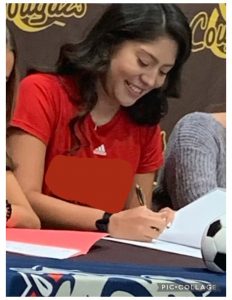
Soccer is one of the biggest and fast growing sports in the world with over 3.5 billion followers and over 250 million people actively playing the sport. In the game of soccer for women there are two different post-collegiate levels you can play in after your academic career: the professional level and the international level. The professional level includes leagues such as the National Women’s Soccer League (NWSL) and Liga F. The National Women’s Soccer League (NWSL) is a professional league in the United States while Liga F is a professional league in Spain. The international level allows an individual player the opportunity to represent and play for their country while playing against other countries.
Over the years more differences between Men’s and Women’s soccer have become apparent. Like recently the pay gap between Women’s soccer and Men’s soccer, or the mistreatment certain organizations give their players in the National Women’s Soccer League (NWSL). Regardless of how many situations have developed within Women’s soccer it has been proven that there is some inequality between the genders. The inequality between the genders isn’t just at a national level but in fact at an international level.
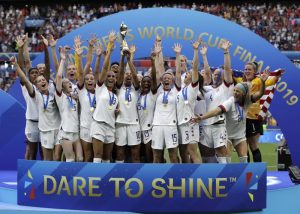
The United States Women’s Soccer Team has had incredible success over the years. They have proven to be one of the most successful international teams, winning four Women’s world cup titles (1991, 1999, 2015, and 2019), four olympic gold medals (1996, 2004, 2008, and 2012), and nine CONCACAF gold cups. As anyone can see the U.S. Women’s team is stacked with success and has earned the reputation they have built. International, national, and local news has consistently reported on the success of women in the sport in fact, the women set a record in 2020. The record they broke was they increased viewership by 20% as well as breaking rating records by 300% with the help of CBS sports and Amazon’s Twitch. In spite of their success, this team has faced many difficulties, such as the pay gap between women’s and men’s soccer as well as the treatment differences between the men’s and women’s team.
In 2019, the U.S women’s team brought their concerns about the pay wage gap to the U.S. soccer federation. The U.S. soccer federation took no action and the women’s team continued their efforts. They used their platform at the 2019 World Cup. After winning that World Cup in France, they were able to get fans in the stadium to chant… Equal Pay! This was monumental for the movement they created. By being able to experience fans chanting in support of the team it meant that international attention was focused on the U.S. soccer federation’s mistreatment of the Women’s Team. This sparked a movement and also allowed many other women’s teams from different countries to have a voice and speak up about their challenges in their own countries. Most importantly this movement allowed many women around the world playing at different levels in soccer to realize the mistreatment that was occurring and impacting them directly.
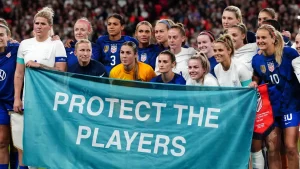
Recently on October 7, 2022 the National Women’s Soccer League (NWSL) many players have reported the verbal and emotional abuse they have been experiencing. Many of the U.S. women’s soccer team players play in the league and they have spoken up and expressed how they feel about these situations and what specifically was happening. The verbal and emotional abuse has affected many players health in the National Women’s Soccer League (NWSL) which raises many concerns. Unfortunately verbal and emotional abuse has been very common in women’s soccer.
Another team who claims to have experienced the mistreatment among women’s soccer teams is the Spain Women’s National Team. As of September 22, 2022 the Spanish Women’s Team accused their head coach of emotional and verbal abuse. This can put their emotional and physical health at risk. Because their main concern is their health, 15 of the players resigned from the team. The resignation of these players sent a worldwide message about the treatment the players in Spain were no longer willing to withstand. The Spanish Team wouldn’t have been able to make this gesture or statement had they not been given a platform. Knowing that other women such as the players in the National Womens Soccer league (NWSL) were experiencing similar unfair treatment encouraged the players to take action.
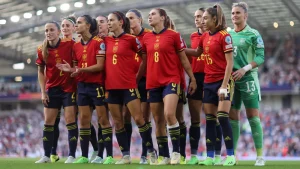
The situations between the United States and Spain Women’s teams are very similar because they both have players that may have been mistreated. The primary difference between the approach to finding resolution for their situation is that the Spain women’s team had players actually left their team in order to create attention about the situation and create change. The United States’ team league governance had players interviewed in order to better understand and resolve the situation. Unfortunately, the affected players with Spain Women’s National Team didn’t feel as though their league governance would fairly respond to their claims, so their only alternative was to leave their organization. Inequality and unfair treatment in women’s soccer is a very important issue to discuss because it is a current, ongoing issue. This issue doesn’t only affect players nationally, internationally, but also trickles down at the collegiate level.
I signed my letter of intent to play collegiate soccer in the fall of 2019. During this time the pay wage gap lawsuit between the men’s and women’s national teams was an ongoing. I watched my idols fight for what they believed in. I saw the struggles and challenges they had to go through. By watching them on television and in social media during this time they voiced what they perceived to be right and wrong within the women’s game and league management. As a first time college soccer athlete in the fall of 2020, I realized that I too was experiencing some inequality. I had to deal with mistreatment just like the National Women’s Soccer League (NWSL), Spain women’s soccer team, and U.S women’s team players. For two years I dealt with emotional abuse. There was no regard for mental health or for the treatment my team was receiving by our head coach and athletic department.
Due to covid, our fall 2020 season was moved to the spring in 2021. During this time all of us as players faced some tough situations. One of the incident that I endured helped me realize I was experiencing gender inequality during the spring 2021 season. We had some women’s soccer games in Arkansas, which meant we had 12 hours of travel time. Instead of getting a big charter bus we were forced to take a mini charter bus. This was due to fact that the football team needed to use multiple charter buses to be dropped off at the airport. We were forced to use an overcrowded minibus for the 12 hour trip. The football team was flown while we weren’t granted that privilege, instead we drove the 12 hours.
In this bus every seat was full, top and bottom storage areas were overflowing, making this an uncomfortable and potentially dangerous journey. Some of us even had to keep luggage and backpacks on our laps or sit on items. We didn’t arrive until 2 a.m. in the early morning of the game. When we arrived at the hotel some of the hotel rooms reeked of cigarette smoke, including my room. Since it was very late we weren’t able to get new rooms. My teammates and I tried sleeping with our jerseys over our heads to help with the smell but of course that did nothing. Most of us woke up with headaches. Some of the players struggled with allergic and asthmatic reactions to the smell. This wasn’t an isolated incident. During many other trips we weren’t properly receiving the right nutrition during travel and at home at the university. This is of great concern for any student athlete.
In the fall of 2021, I continued to report these challenges and nothing was changing. Like the Spanish women’s soccer players, I made a decision to leave. I began looking for other academic options. My long term soccer and academic success was at risk due to a decline in my mental and physical health. My transfer to another institution that treats everyone equally and respectfully, while prioritizing the players needs has resulted in new opportunities. I’m now completing my first season at my new university successfully. I have hope that my previous university is making positive changes based on current media posts. While my former peers are attributing these changes to my abilities to be outspoken about them, there was still a personal cost to initiate change. It is also apparent that women’s collegiate and professional leagues can benefit from both traditional media and social media discussions about the disparities.
Unfortunately inequality in women’s soccer has been an ongoing battle for decades. This issue has affected many women and girls and continues to affect anyone who plays the sport today. This controversial topic has not only affected women’s soccer players at a national or international level but is also spreading like wildfire in collegiate soccer and is starting to find its way into youth soccer. Fortunately, there are coaches and athletic programs that do look out for the wellbeing of their female players. It’s important to consider this when selecting where you will play. Public support for fairness is also an ongoing help to resolve these challenges.
_________
- Braidwood, Ella. “U.S. Players Won Their Equal Pay Fight. Their Rivals Took Notes.” The New York Times, October 10, 2022, sec. Sports. https://www.nytimes.com/2022/10/10/sports/soccer/uswnt-equal-pay.html
- Press, Associated. “Spain Beat USWNT as Both Teams Deal with Off-Field Problems.” The Guardian, October 11, 2022, sec. Football. https://www.theguardian.com/football/2022/oct/11/spain-beat-uswnt-as-both-teams-deal-with-off-field-problems.
- Summers, Juana, Miguel Macias, and Sarah Handel. “Players on Spain’s Women Soccer Team Say They Won’t Play until Changes Are Made.” NPR, September 30, 2022, sec. Sports. https://www.npr.org/2022/09/30/1126281357/players-on-spains-women-soccer-team-say-they-wont-play-until-changes-are-made.
- “Five Things to Know: Spain.” Accessed October 14, 2022. https://www.ussoccer.com/stories/2022/10/international-friendly-uswnt-vs-spain-match-history-preview-five-things-to-know.
- Página web oficial de LaLiga | LaLiga. “Liga F 2022/23.” Accessed October 14, 2022. https://www.laliga.com/en-GB/futbol-femenino.
- “National Women’s Soccer League Official Site | NWSL.” Accessed October 14, 2022. https://www.nwslsoccer.com/.
- Web oficial de la Real Federación Española de Fútbol. “COMUNICADO OFICIAL | Selección absoluta femenina de fútbol | www.rfef.es,” September 22, 2022. https://rfef.es/es/noticias/oficial-2209.
- “Players on Spain’s Women Soccer Team Say They Won’t Play until Changes Are Made.” All Things Considered. NPR, September 30, 2022. https://www.npr.org/2022/09/30/1126281357/players-on-spains-women-soccer-team-say-they-wont-play-until-changes-are-made.
- Yang, Steph. “Abuse in the NWSL: A Complete Timeline of Allegations, Reports and Inaction.” The Athletic. Accessed October 14, 2022. https://theathletic.com/3677339/2022/10/10/nwsl-abuse-allegations-timeline/.
- “Las Secuencias Piropo-Respuesta y Cumplido-Respuesta: Tipología y Ejemplos. – Record Details – EBSCO Discovery Service.” Accessed October 14, 2022. https://discovery.ebsco.com/c/cxw37y/details/zeemqzhbfz?limiters=FT1%3AY&q=How%20%20men%20from%20spain%20compliment%20women.
- ESPN. “Spain Soccer – Spain News, Scores, Stats, Rumors & More.” Accessed October 14, 2022. https://www.espn.com/soccer/team/_/id/17640/spain.
- “Spain vs. United States – Football Match Report – October 11, 2022 – ESPN.” Accessed October 14, 2022. https://www.espn.com/soccer/report/_/gameId/653785.
- “Spain Women’s Soccer Stars Refuse to Play in Dispute Over Coach – The New York Times.” Accessed October 14, 2022. https://www.nytimes.com/2022/09/23/sports/soccer/spain-soccer-women-jorge-vilda.html.
- “USWNT Players Support Spain Women’s Team amid Messy Battle over Working Conditions.” Accessed October 14, 2022. https://sports.yahoo.com/spain-womens-soccer-uswnt-players-181219270.html?guccounter=1&guce_referrer=aHR0cHM6Ly93d3cuZ29vZ2xlLmNvbS8&guce_referrer_sig=AQAAAKdGykcs1hmQ-rfCkymVK9dr465E4wEobpQ1BsZK_0NiKe5snxxhhRoTEcMVewgFrC9ZtEHK3Y81UW7EWluc0kTWa_S5dNjRB_G7xvUjFQLh5r-_DWx7muZezBuHJsL9WGfc3SdcR6W-mqN4OYmEtPlIrwQWI-sm4vPf8Gr8EzkB.
- Azzi, Alex. “Yates Report Takeaways Extend beyond NWSL: ‘Guardrails’ Are Essential for Women’s pro Sports.” On Her Turf (blog), October 10, 2022. https://onherturf.nbcsports.com/2022/10/10/yates-report-takeaways-extend-beyond-nwsl-guardrails-are-essential-for-womens-pro-sports/.
- “U.S. Soccer Equal Pay Agreement: What to Know | AP News.” Accessed October 14, 2022. https://apnews.com/article/us-soccer-equal-pay-agreement-what-to-know-2440a70f4d06c398bc3efe6dff92f154.
- “All the Records Team USA Broke in the 2019 Women’s World Cup | Time.” Accessed October 14, 2022. https://time.com/5621639/team-usa-2019-world-cup-records/.
- “Mutiny in Spain Women’s Squad as 15 Players Threaten to Quit If Coach Is Not Sacked | Goal.Com US.” Accessed October 14, 2022. https://www.goal.com/en-us/news/mutiny-spain-women-team-15-players-threaten-quit-coach-sacked/blt69f99c840d6b4c5c.
- MARCA. “The USWNT Inspires Spain: 15 Players Abandon the Women’s National Team,” September 22, 2022. https://www.marca.com/en/football/2022/09/23/632ceb0e268e3e95198b45aa.html.
- Press, Associated. “In Soccer-Mad Argentina, Women Fight Sexism and Inequality.” VOA. Accessed October 14, 2022. https://www.voanews.com/a/in-soccer-mad-argentina-women-fight-sexism-and-inequality/4777365.html.
- Gao, Michelle. “Women’s Soccer Set Viewership Records in 2020 — Now It Needs to Keep Them Watching.” CNBC. Accessed November 11, 2022. https://www.cnbc.com/2020/12/13/womens-soccer-viewership-records-paving-expansion.html.
- “NWSL Abuse Report: Fans Are Outraged and Players Are Exhausted after Damning Women’s Soccer Abuse Report. Here’s What’s next | CNN.” Accessed November 11, 2022. https://www.cnn.com/2022/10/07/football/nwsl-soccer-abuse-explainer-intl-spt.
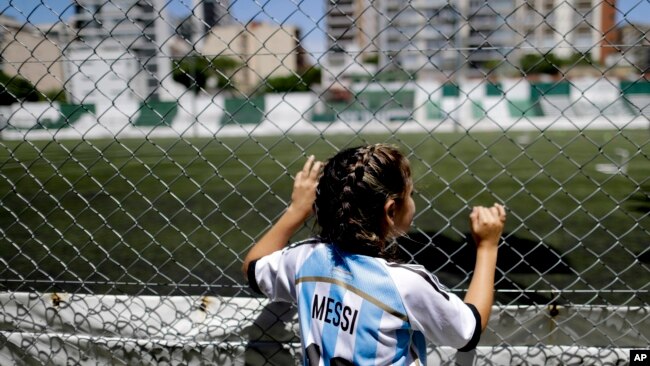


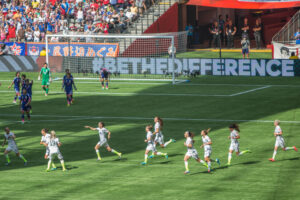
20 comments
Karly West
Amazing article, I love that it highlights the world’s current issue with inequality. It’s baffling when you see how much more money male soccer players get in comparison to female soccer players just because of their sex. We see this bias in basketball too which is insane because the WMBA is very popular! The inclusion of your personal experience really made this article stand out to me. Good job!
Hailey Koch
You did a fantastic job on your article I really enjoyed reading it. It’s crazy to learn that with all the changes the world has gone through within inequality, there are still many issues. With a team as impressive as the United State’s Woman’s team there are still problems with the Men’s team getting better pay or better treatment. It’s especially crazy to learn that with how well the Woman’s team has been doing over the years, they have built such incredible things for so many kids and even adults to look up to with their great accomplishments.
Abbey Stiffler
I am aware as a female athlete myself of the inequalities women face in sports when compared to men’s sports. I really like how you connected a personal experience to the story. It is shocking to see that female athletes don’t even have a chance, given the significant impact that professional athletes have on the lives of many young athletes. Congrats on your award!
Madeline Bloom
To be a female athlete in todays world is difficult. Professional athletes make a huge impact on many young athletes lives and to see that female athletes don’t even get a chance is unbelievable. The women’s soccer team is one of the best in the country and to think that they are getting paid less than the men’s team that is not nearly as good is unfair. You described the situation very well and I am glad that I chose to read it.
Sarah Guerrero
Congratulations on your nomination, Nicole! I’m so glad that you included pieces of your own experience; it really brought together the narrative of your article. This is definitely a tough issue to write about, especially since it’s so personal for you. But you wrote about it well and with poise, despite all of the wrong that you experienced. I know that the best is yet to come for you in soccer and everything else that you put your mind to. Good job!
Jose Luis Gamez, III
Nicole, congratulations on a great article written. As a male athlete myself, I understand the differences that you describe in this article. I just hope one day that both genders are treated equally.
Morgan Cassias
I loved how you made it personal. It really showed how relatable this topic can be. It was such a great story to read. I know what it’s like to be so passionate about a sport and I really admire that in your writing. I’m a sucker when it comes to sports. Right up my alley with my major in exercise sports science. Congratulations on your nomination! You did a great job with your article. Truly impressed!
Alia Hernandez Daraiseh
Congratulations on getting your article published and nominated. I love the way the details flowed with the story, and how you used a personal experience to correlate with the story. Thank you for being able to share your story to the public, and being able to write an article to convey your message to anyone who reads your article.
Alyssa Leos
First of all I want to say congratulations on your article being nominated for an award. I really like how you applied your own challenges to your article. It really made it feel real. I’m sorry for your experience with inequality. It’s not fair that women are always shown as “the less superior gender”. I really hope one day everything will change for the better. Again congratulations on your article being nominated. Very well deserved!
Dejah Garcia
Nicole you did such a great job ! Congratulations on your nomination! This stood out to me because i used to play soccer! I think you did a awesome job connecting the soccer world to the audience! Overall you did a great job. I loved you organization and imagery that you used in the article, again congratulations on your nomination girl ! Best of luck 🙂